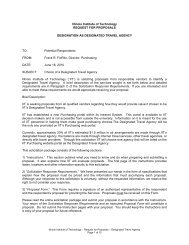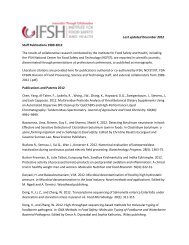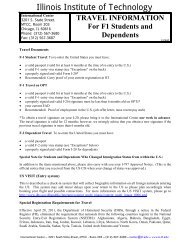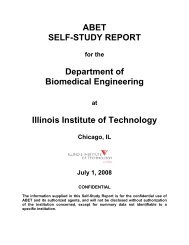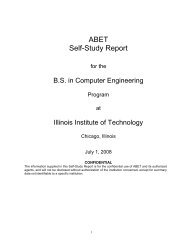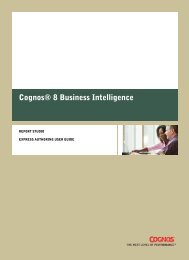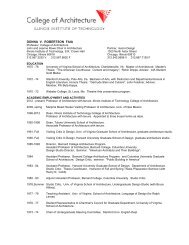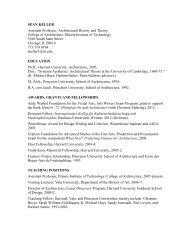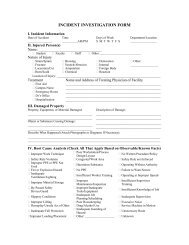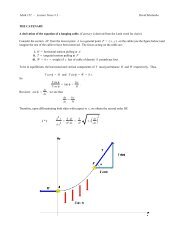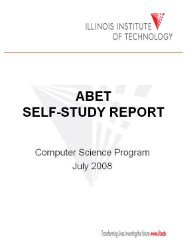Copyright & Disclaimer Information - Illinois Institute of Technology
Copyright & Disclaimer Information - Illinois Institute of Technology
Copyright & Disclaimer Information - Illinois Institute of Technology
Create successful ePaper yourself
Turn your PDF publications into a flip-book with our unique Google optimized e-Paper software.
184<br />
Course Descriptions<br />
HIST 332<br />
American Women 1840–1990<br />
An examination <strong>of</strong> how women<br />
shaped the course <strong>of</strong> U.S. history and<br />
<strong>of</strong> how key political and social events<br />
shaped their lives. Since no single<br />
experience conveys the history <strong>of</strong> all<br />
American women, this course will<br />
discuss the diverse realities <strong>of</strong><br />
women <strong>of</strong> different races, classes,<br />
ethnicities, and political tendencies.<br />
It looks at how and why the conditions,<br />
representations, and identities<br />
<strong>of</strong> women changed or remained the<br />
same. By incorporating women into<br />
our vision <strong>of</strong> history we develop a<br />
more complete understanding <strong>of</strong> our<br />
past. Prerequisite: A 100-level humanities<br />
course.(3-0-3) (H) (C)<br />
HIST 333<br />
Ethnicity in American History and Life<br />
Examines the creation <strong>of</strong> the<br />
American nationality from its diverse<br />
roots, which include almost all the<br />
world’s great cultures. Special stress<br />
on immigration, African American<br />
history, and the relationships among<br />
concepts <strong>of</strong> race, class and gender.<br />
Prerequisites: A 100-level humanities<br />
course. (3-0-3) (H) (C)<br />
HIST 334<br />
The Creation <strong>of</strong> America:<br />
The New World to 1789<br />
Examines how the U.S., its values<br />
and its institutions came to be.<br />
Colonization, “Indian” relations, slavery,<br />
the American Revolution and the<br />
Constitution are studied in the context<br />
<strong>of</strong> the colonial world, including<br />
Latin America. Controversial issues<br />
and the challenge <strong>of</strong> discovery are<br />
stressed. Prerequisite: A 100-level<br />
humanities course. (3-0-3) (H) (C)<br />
HIST 336<br />
The Industrialization <strong>of</strong> America: 1789–1898<br />
Traces America’s transformation from<br />
agrarian republic to Industrial<br />
Empire. Stresses impact <strong>of</strong> industrialization<br />
on all aspects <strong>of</strong> life, the<br />
nature <strong>of</strong> slavery, the failures <strong>of</strong><br />
“Reconstruction,” and the western and<br />
urban frontiers. Explores the adventures<br />
that made America a great<br />
power. Prerequisite: A 100-level<br />
humanities course. (3-0-3) (H) (C)<br />
<strong>Copyright</strong> & <strong>Disclaimer</strong> <strong>Information</strong>: <strong>Copyright</strong> © 1994, 1995, 1996, 1997, 1998, 1999, 2000, 2001, 2002, 2003, 2004, 2005, 2006, 2007. CollegeSource®, Inc. and Career Guidance Foundation. CollegeSource® digital catalogs are derivative works owned and copyrighted by CollegeSource®, Inc. and Career Guidance Foundation. Catalog content is owned and copyrighted by the appropriate school. While CollegeSource®, Inc. and Career Guidance Foundation provides information as a service to the public, copyright is retained on all digital catalogs.<br />
<strong>Copyright</strong> & <strong>Disclaimer</strong> <strong>Information</strong>: <strong>Copyright</strong> © 1994, 1995, 1996, 1997, 1998, 1999, 2000, 2001, 2002, 2003, 2004, 2005, 2006, 2007. CollegeSource®, Inc. and Career Guidance Foundation. CollegeSource® digital catalogs are derivative works owned and copyrighted by CollegeSource®, Inc. and Career Guidance Foundation. Catalog content is owned and copyrighted by the appropriate school. While CollegeSource®, Inc. and Career Guidance Foundation provides information as a service to the public, copyright is retained on all digital catalogs.<br />
HIST 337<br />
The American Century: 1898–1975<br />
Traces how America attained economic<br />
and military power and what it did<br />
with that power at home and abroad.<br />
Discusses the World Wars, the Great<br />
Depression, the limits <strong>of</strong> the “welfare<br />
state,” the movement for Black equality,<br />
and the transformations <strong>of</strong> the<br />
1960s. Prerequisite: A 100-level<br />
humanities course. (3-0-3) (H) (C)<br />
HIST 338<br />
Contemporary America: 1960 and After<br />
Explores the historical roots <strong>of</strong> contemporary<br />
issues. Topics vary by<br />
semester but always include the Cold<br />
War and America’s international<br />
position, tensions over immigration<br />
and racial integration, and the historic<br />
roots <strong>of</strong> changes in popular culture<br />
and daily life. Prerequisite: A<br />
100-level humanities course. (3-0-3)<br />
(H) (C)<br />
HIST 340<br />
Rise <strong>of</strong> Global Economy<br />
A historical analysis <strong>of</strong> contemporary<br />
globalization in trade, technology,<br />
labor and culture. The course includes<br />
a comparative analysis <strong>of</strong> the world’s<br />
leading economies (e.g. Great Britain,<br />
Germany, United States and Japan)<br />
and considers their varied responses<br />
to industrial revolutions in the past<br />
two centuries. Prerequisite: A 100-level<br />
humanities course. (3-0-3) (H) (C)<br />
HIST 343<br />
Islam in the Modern Era<br />
This course will examine the philosophical,<br />
theological, and legal roots<br />
<strong>of</strong> Islam from Mohammed to the<br />
present. We will focus on what it<br />
means to be Islamic in the Middle<br />
East, what it means to practice Islam<br />
in a Western culture, and the ways<br />
in which individuals who practice<br />
Islam are affected by Western ideology:<br />
both theological (i.e. Judeo-<br />
Christian) ideations as well as<br />
Western notions <strong>of</strong> civil liberties dating<br />
as far back as the Magna Carta<br />
and even to First Century Roman<br />
Law. Prerequisite: A 100-level<br />
humanities course. (3-0-3) (H) (C)<br />
IIT Undergraduate Bulletin 2006–2008<br />
HIST 345<br />
Women and the World: 20th Century<br />
This course examines how women in<br />
different regions <strong>of</strong> the world have<br />
helped to shape their nation’s society<br />
and history. It also explores the connections<br />
and/or lack <strong>of</strong> connections<br />
between women, women’s movements,<br />
and key political events during the<br />
twentieth century. The course will<br />
both draw some general themes and<br />
look at some specific case studies.<br />
Prerequisite: A 100-level humanities<br />
course. (3-0-3) (H) (C)<br />
HIST 349<br />
African-American Experience<br />
A study <strong>of</strong> the African-American experience<br />
since 1800, including African<br />
roots, formal and informal institutions<br />
<strong>of</strong> oppression, change in continuity in<br />
folk culture, and history <strong>of</strong> social institutions.<br />
Prerequisite: A 100-level<br />
humanities course. (3-0-3) (H) (C)<br />
HIST 350<br />
U.S. Urban History<br />
Basic facts and issues <strong>of</strong> U.S. urban<br />
history; reasons for the growth,<br />
development and decay <strong>of</strong> cities; origins<br />
<strong>of</strong> contemporary urban political,<br />
social and economic problems.<br />
Prerequisite: A 100-level humanities<br />
course. (3-0-3) (H) (C)<br />
HIST 352<br />
History <strong>of</strong> Chicago<br />
Basic institutions <strong>of</strong> the contemporary<br />
city studied in their historical context,<br />
using Chicago as a case study.<br />
Political machines, social and political<br />
reform traditions, planning agencies,<br />
ethnic neighborhoods, organized<br />
crime, and many other urban institutions.<br />
Prerequisite: A 100-level<br />
humanities course. (3-0-3) (H) (C)<br />
HIST 361<br />
The Atomic Age<br />
A historical inquiry into the development<br />
<strong>of</strong> nuclear energy, its military<br />
uses, policy formation, and the attendant<br />
problems. Topics included:<br />
Manhattan Project, decision to use<br />
the bomb, legislation, AEC, arms<br />
race, testing, fallout, civil defense,<br />
disarmament efforts, foreign programs,<br />
espionage. This upper level<br />
course is reading intensive. Students<br />
are expected to read the required



